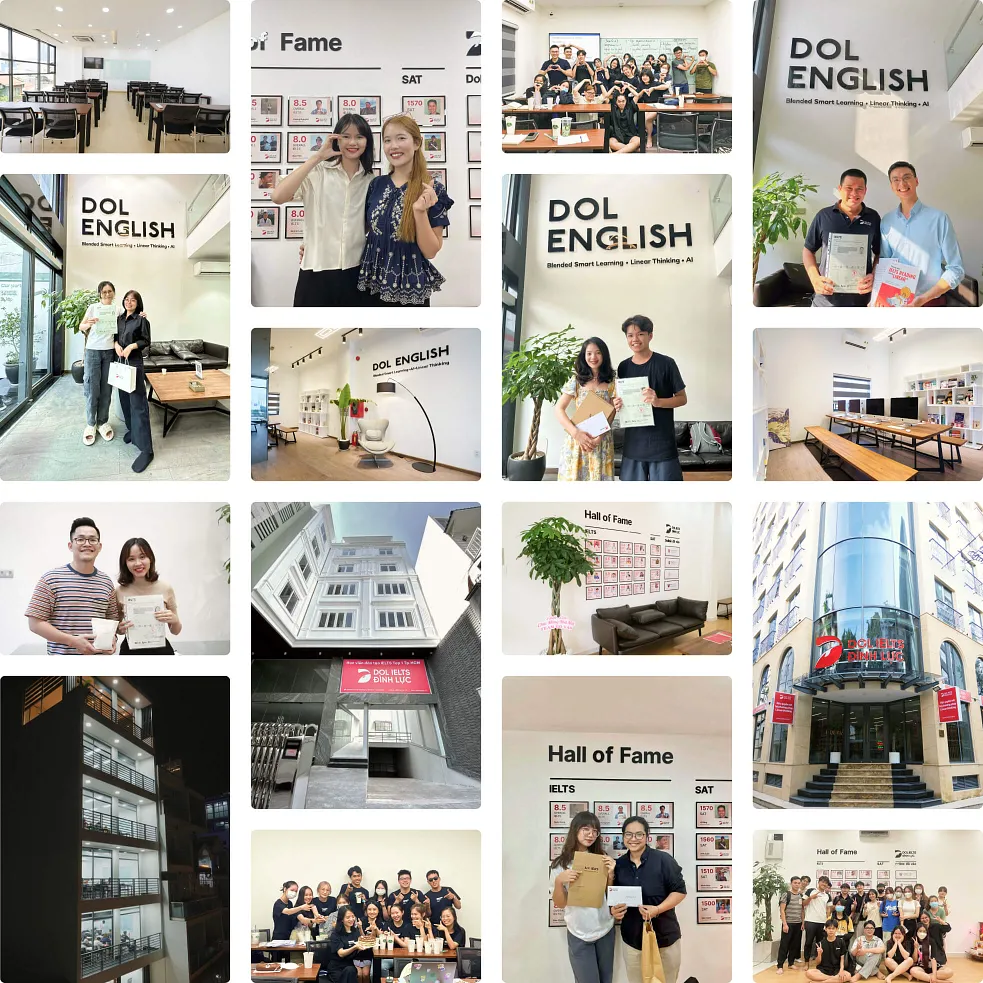IELTS Writing Task 2 chủ đề Education - Idea và từ vựng theo topic, subtopic
Education là topic khá quen thuộc với nhiều thí sinh. Tuy nhiên, Education không chỉ gói gọn trong những chủ đề thường gặp như đi du học, học nghề… mà còn có thể mở rộng ra thành rất nhiều những subtopics khác. Bài viết dưới đây sẽ tổng hợp những subtopics thường gặp nhất trong chủ đề Education cũng như cung cấp kho ideas và vocab xịn sò được sắp xếp theo tư duy Linearthinking cho học viên. (Tìm hiểu thêm về cách học vocab theo tư duy Linearthinking tại đây #Link 94 Tổng hợp từ vựng hay cho IELTS Task 2).
DOL IELTS Đình Lực
Oct 25, 2022
2 mins read

Table of content
Các subtopics thường gặp và đề bài
Idea và từ vựng theo subtopic
Bài mẫu
Đề bài - Topic 1
Bài mẫu Sample Essay
Luyện tập thêm
Các subtopics thường gặp và đề bài
Những subtopics có thể được khai thác trong chủ đề “Education" có thể kể đến:
Homework for children
Teaching relevant subjects to children (Science subjects, history, art…)
The influence of technology on education
Studying abroad
Wearing uniforms
Funding in education
Parents put pressure on students
Cùng quan sát thử một vài đề bài xoay quanh những subtopics trên nhé
Topic 1:
University education should be free to everyone, regardless of income. To what extent do you agree or disagree?
Topic 2:
In some countries, young people are encouraged to study abroad What are the advantages and disadvantages of this trend?
Topic 3:
Some high schools require all students to wear school uniforms. Other high schools permit students to decide what to wear to school. Which of these two school policies do you think is better?
Topic 4:
Government should invest in teaching science subjects rather than other subjects for the country to develop and progress. To what extent do you agree or not agree?
Idea và từ vựng theo subtopic
Áp dụng tư duy Linearthinking, thay vì học từ vựng theo kiểu liệt kê từng collocation riêng lẻ, thí sinh nên sắp xếp những từ vựng theo dòng ý tưởng và mô hình tư duy trong đầu (mental model) để dễ học và dễ nhớ để sử dụng hơn.
(Tìm hiểu thêm về cách học vocab theo tư duy Linearthinking tại đây #Link #94 Tổng hợp từ vựng hay cho IELTS Task 2)
Những từ vựng trong các subtopic của chủ đề Education có thể được sắp xếp theo mental model Advantages và Disadvantages như sau:
Advantages/For | Disadvantages/Against | |
Giving children homework everyday | - be forced to work independently away from the environment of schools => proactively apply the knowledge that they have learnt in the classroom => think individually and creatively in correspondence to a particular task => develop an independent study habit => prepare them to work alone as adults. - Have home assignments completed multiple times on a daily basis => serve as an additional practice and revision of the lesson taught to them in the school => retain information more easily => reduce the exam stress considerably. | - have an obligation to complete the homework while having to deal with an excessive load of knowledge at their school + constant examinations => sacrifice their sleep to meet academic demands => exhaust the child + reduce their interest in school studies => suffer from depression. - Return home with excessive amounts of homework=> reduce children’s after-school time for other extracurricular and leisure activities => unable to develop necessary soft-skills |
Teaching history subjects | - have thorough insights into what happened in the past in one’s own country => understand their hometown’s traditional values and develop a national identity => take pride in their origins and treasure the life they know as it is today. - accumulate knowledge of this particular field at an early age => enhance their understanding about various aspects of the world => to work for foreign enterprises, especially those who highly value company culture. | - Learn history => be imposed to memorize dates and events from the past => rarely use them in people’s lives => be of little relevance to future and today’s society. - (historical events) be seen in different perspectives and interpreted in different ways => (students) normally learn the subject through only one source => discount its importance as a subject for learning. |
Focusing on Science subjects | - Force people to choose scientific subjects like biology, mathematics, physics and chemistry => ensure that any knowledge and skill gaps in the economy are covered => increase the overall GDP of the nation => improve a country’s future prosperity. - attain science degrees => be provided with foundational knowledge to adapt to the fast-moving technological development => increase their future employment prospects. | - (A major in science) consists of related subjects with a great amount of specialized knowledge and tough experiments => require a lot of diligence + patience + intelligence => put students under great pressure in order to understand and handle the tasks well. - (some countries) have fewer employment opportunities available in science fields => have little chance to get a job after graduation despite spending a huge amount of time and effort on this particular subject => increase the employment rate. |
Making art & music compulsory | - learn art-related subjects from institutions => enjoy learning through enjoyable and creative methods => enhances fine motor skills, hand-eye coordination and problem-solving skills => assists children in attaining better learning outcomes. - be more interested in non-academic subjects => get hands on experience in these subjects at an early age => give students a platform where they can develop and perfect their artistic skills => become easier for them to pursue their creative career in future. | - be already burdened with a regular academic curriculum => (perform art) enhance that study load => decrease their academic results. - be of the mindset that art has no participation in the advancement of human society => be generally considered as a hobby rather than a professional field => opt for other vocational subjects such as science or commerce stream, which have jobs available in abundance. |
The influence of technology on education | + Incorporate technology in teaching => Example: use visual aids, presentations, video clips… => engage students in the lesson => improve the teaching and learning quality + enable the use of online classes => provide a good education for students from rural areas => improve their career prospects | + the development of technological devices (ex: cellphones, ipads, television…) => easily distract students from their study => affect study performance |
Studying abroad | + Experience a completely different way of living. Ex: try exotic foods and learn about traditions unique to the host culture => more knowledgeable, open-minded and tolerant => become a global citizen of the 21st century + Grant students the opportunity to completely immerse oneself in a new language => receive considerable language practice => see significant improvements in language proficiency | + Might struggle to integrate into local opportunities + Lack the emotional support of family => Suffer from social isolation, loneliness, and homesickness => More likely to develop mental health issues such as depression and anxiety +Have to factor in flights, accommodation, travel expenses, and living costs => Otherwise: the price of a year abroad can escalate without you realising. => exacerbate financial stress |
Wearing uniforms | + wear the same clothes everyday => students do not need to spend time thinking about what to wear => save time on other more useful activities + all students wear the same clothes => bridge the gap between the rich and the poor # have freedom to wear any clothes they want => rich students may show off => widen social gaps | + wear the same clothes => deter students from showcasing their unique personalities => a lack of self-expression + wear the same clothes everyday => boring => demotivate students |
Funding in education | + government pays for children's education => receive equal education opportunities => attract low-income students => enable unprivileged children to obtain higher paying jobs after graduation => can make greater contributions to the national economy => poverty would evaporate quickly + provide complete financial support for students' education => minimize the amount of time spent on unproductive and harmful activities => prevent the development of social issues among children | + provide financial support for a booming student population => the money being spent on each individual drops to a historic low => standards of education are compromised => fail to produce outstanding graduates => struggle to bring about truly revolutionary innovations for society + make education free for children => the government has to cover a variety of expenses. Example: salaries for professors, textbooks for students, modern classroom equipment => drain the state budget => resources for other sectors are depleted |
Parents put pressure on students | - teach students about hard work + encourage them to try harder in life => develop good personality traits in later life (perseverance) - good academic results => higher chance of getting into good universities => improve future career projects | - encourage their children to acquire an occupation that they do not have passion for => (children) not express their own ideas and desires => not feel the real sense of job satisfaction => have an undesirable life. - engage their children only for future achievements + omit the entertainment part of the youngsters => (children) be exposed to great stress => affect their mental wellbeing and cause psychological suffering. |
Bài mẫu
Cùng quan sát thử một bài viết mẫu thuộc chủ đề Education, áp dụng các ideas và vocab trong bảng tổng hợp phía trên nhé!
Đề bài - Topic 1
University education should be free to everyone, regardless of income. To what extent do you agree or disagree?
Bài mẫu Sample Essay
Some people believe that the government should provide a free university education to all students regardless of how much money they make. From my perspective, while I acknowledge the benefits of doing this, I still believe it is unreasonable for the government to offer an education at no cost.
On the one hand, it is true that there are several benefits that students can reap from receiving a free education. In fact, when the government pays for students' education, it means that all students have equal education opportunities. This can attract low-income students and enable unprivileged students to obtain higher paying jobs after graduation. As a result, it can make greater contributions to the national economy, and therefore poverty would evaporate quickly. In addition, allowing poor students to spend time studying also minimizes the amount of time spent on unproductive and harmful activities. Thus, it can prevent the development of social issues among children
However, I still argue that it is not feasible to provide a free education for everyone. As for the first drawback, since the government has to provide financial support for a booming student population, the money being spent on each individual drops to a historic low. This results in compromised standards of education and the education ultimately fails to produce outstanding graduates. Moreover, making education free for children means that the government has to cover a variety of expenses, such as salaries for professors, textbooks for students, modern classroom equipment… This may drain the state budget and deplete the resources for other sectors.
In conclusion, while I agree that providing a free university education for everyone can be beneficial in some aspects, I still believe that doing this can affect the society in negative ways and thus should not be encouraged.
Luyện tập thêm
Cùng luyện tập thêm với những đề thi IELTS gần đây nhất tại kho đề IELTS Task 2 của DOL nhé! #Link 77 Tổng hợp đề thi mẫu Writing
Table of content
Các subtopics thường gặp và đề bài
Idea và từ vựng theo subtopic
Bài mẫu
Đề bài - Topic 1
Bài mẫu Sample Essay
Luyện tập thêm

